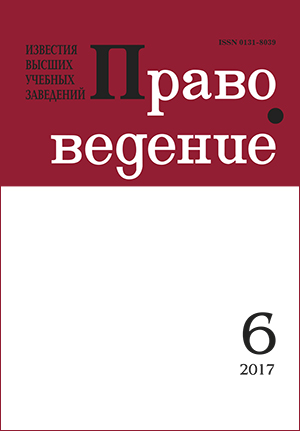Опыт права: от психологизма до феноменологической герменевтики
Аннотация
Статья посвящена феномену правового опыта. Проблема помещается в широкий историко-философский контекст и мыслится как часть проблемы онтологического единства. При этом вопрос о природе права трансформируется в вопрос об основаниях права в опыте и природе последнего. С целью прояснения этого вопроса рассмотрены методологические основания, сущность и внутренние противоречия ряда концепций, укореняющих право в том или ином аспекте опыта, который понимается как базовый, а также взаимосвязь между ними. Так, автор психологической теории права Л. И. Петражицкий локализует основания права в эмоциональном опыте, оставляя, однако, открытым вопрос об основаниях самих эмоций. В свою очередь феноменология права, во многом мотивированная стремлением преодолеть психологизм, усматривает первореальность права в опыте очищенного от всех предрассудков сознания, которому и открывается с очевидностью смысл (феномен) права. Вместе с тем феноменология не дает удовлетворительного ответа на вопрос о том, как связан феномен права с нашим повседневным опытом. Наконец, философская герменевтика, стремящаяся преодолеть апории феноменологического проекта, мыслит базовый уровень опыта, в котором человек оказывается причастен к миру, как опыт конкретного сущего, а структуру этого опыта — как герменевтический круг нашего существования во времени во взаимодействии с миром. Последнее осуществляется в форме диалога, исход которого никогда не предрешен заранее, а потому предполагает фундаментальную открытость и готовность признать другого в его притязании на истину, что и рассматривается как основание нормативности. Усматривая основания права уже не в психическом опыте, но и не в опыте редуцированного сознания, а в опыте как таковом, т. е. опыте собственной историчности, герменевтическая концепция права оказывается гораздо ближе к классическим онтологическим теориям естественного права, чем к позднейшим деонтологическим концепциям, укореняя должное в самой структуре опыта.
Ключевые слова:
опыт права, психологическая теория права, Л. И. Петражицкий, феноменология права, герменевтическая философия права
Скачивания
Библиографические ссылки
References
Alekseev N. N. Osnovy filosofii prava [Foundation of the Philosophy of Law]. St.Petersburg, Lan Publ., 1999. 256 p. (In Russian)
Aristotle. Nikomakhova etika [Nicomachean Ethics]. Aristotle. General Works in 4 vols. Vol. 4. Moscow, Mysl’ Publ., 1983, pp. 53–293. (In Russian)
Brentano F. Izbrannye raboty [Selected Works]. Moscow, Dom intellektualnoi knigi, Russkoe fenomenologicheskoe obshchestvo Publ., 1996. 176 p. (In Russian)
Finnis J. Some Questions about Normativity and History in Petrażycki. Text of the report at the International Academic Conference “The Scientific Legacy of Leon
Petrażycki: History and Modernity (on the 150th Anniversary of his Birth)” (St. Petersburg, 14–15 December 2017).
Flyvbjerg B. Making Social Science Matter: Why Social Inquiry Fails and Hоw It Can Succeed Again. Cambridge, Cambridge University Press, 2001. 212 р.
Gadamer H.-G. Istina i metod: Osnovy filosofskoi germenevtiki [Truth and Method]. Moscow, Progress Publ., 1988. 704 p. (In Russian)
Gurvitch G. Filosofiia i sotsiologiia prava: izbr. soch. [Philosophy and Sociology of Law: Selected Works]. St. Petersburg, Izdatelskii Dom St. Peterb. gos. un-ta, Izdatelstvo iuridicheskogo fakulteta St. Peterb. gos. un-ta, 2004. 848 p. (In Russian)
Heidegger M. Fenomenologicheskie interpretatsii Aristotelia (Ekspozitsiia germenevticheskoi situatsii) [Phenomenological Interpretations of Aristotle (Initiation into Phenomenological Research)]. St. Petersburg, Gumanitarnaia akademiia Publ., 2012. 224 p. (In Russian)
Heidegger M. Prolegomeny k istorii ponyatiia vremeni [History of the Concept of Time: Prolegomena]. Tomsk, Vodolei Publ., 1998. 384 p. (In Russian)
Husserl E. Filosofiia kak strogaia nauka [Philosophy as Rigorous Science]. Novocherkassk, Saguna Publ., 1994. 357 p. (In Russian)
Husserl E. Idei k chistoi fenomenologii i fenomenologicheskoi filosofii [Ideas Pertaining to a Pure Phenomenology and to a Phenomenological Philosophy]. Moscow, Akademicheskii proekt Publ., 2009. 489 p. (In Russian)
Husserl G. Pravo i mir [Law and World]. Izvestiia vuzov. Pravovedenie, 2015, no. 3, pp. 153–188. (In Russian)
Maksimov S. I. Pravovaia realnost’: opyt filosofskogo osmysleniia [Legal Reality: Experience of Philosophical Reflection]. Kharkov, Pravo Publ., 2002. 328 p. (In Russian)
Melkevik B. Iuridicheskaia praktika v zerkale filosofii prava [Legal Practice in the Mirror of Legal Philosophy]. St. Petersburg, Alef-Press Publ., 2015. 288 p. (In Russian)
Merleau-Ponty M. Somneniia Sezanna [Cézanne’s Doubt]. (Post)fenomenologiia: novaia fenomenologiia vo Frantsii i za ee predelami [(Post) phenomenology: a New Phenomenology in France and Beyond]. Moscow, Akademicheskii proekt Publ., 2017, pp. 102–118. (In Russian)
Mootz F.-J. III. Law, Hermeneutics and Rhetoric. Ashgate, 2010. 492 р.
Petrażycki L. K voprosu o sotsialnom ideale i vozrozhdenii estestvennogo prava [On the Question of the Social Ideal and the Revival of Natural Law]. Iuridicheskii vestnik [Law Herald], 1913, vol. 2, pp. 5–59. (In Russian)
Petrażycki L. Predislovie i vvedenie v nauku politiki prava [Foreword and Introduction to Science of the Policy of Law]. Universitetskie izvestiia [University Proceedings]. 1896, no. 8, pp. I–XCIX. (In Russian)
Petrażycki L. Teoriia prava i gosudarstva v sviazi s teoriei nravstvennosti [Theory of Law and the State in Connection with the Theory of Morality]. Moscow, Rossiiskaia politicheskaia entsiklopediia (ROSSPEN) Publ., 2010. 800 p. (In Russian)
Reinach A. Apriornye osnovaniia grazhdanskogo prava [A priori Foundations of the Civil Law]. Reinach A. Sobranie sochinenii [Collection of works]. Moscow, Dom intellektualnoi knigi Publ., 2001, pp. 153–326. (In Russian)
Ricoeur P. Konflikt interpretatsii. Ocherki o germenevtike [The Conflict of Interpretations. Essays in Hermeneutics]. Moscow, Akademicheskii proekt Publ., 2008. 695 p. (In Russian)
Ricoeur P. Spravedlivoe [The Just]. Moscow, Gnozis, Logos Publ., 2005. 304 p.(In Russian)
Ricoeur P. Torzhestvo iazyka nad nasiliem. Germenevticheskii podhod k filosofii prava [The Victory Language Gains over Violence]. Voprosy filosofii [Issues of Philosophy]. 1996, no. 4, pp. 27–36. (In Russian)
Sloterdijk P. Kritika tsinicheskogo razuma [Critique of Cynical Reason]. Ekaterinburg, U-Faktoriia Publ., Moscow, AST MOSKVA Publ., 2009. 800 p. (In Russian)
Stovba O. V. Temporalnaia ontologiia prava [The Temporal Ontology of Law]. St. Petersburg, Alef-Press Publ., 2017. 355 p. (In Russian)
Weinreb L. Natural Law and Rights. Natural Law Theory: Contemporary Essays. Oxford, Oxford University Press, 1992, pp. 278–308.
Weizsäcker K. F. von. Fizika i filosofiia [Physics and Philosophy]. Voprosy filosofii, 1993, no. 1, pp. 115–125. (In Russian)
Загрузки
Опубликован
Как цитировать
Выпуск
Раздел
Лицензия
Статьи журнала «Правоведение» находятся в открытом доступе и распространяются в соответствии с условиями Лицензионного Договора с Санкт-Петербургским государственным университетом, который бесплатно предоставляет авторам неограниченное распространение и самостоятельное архивирование.




